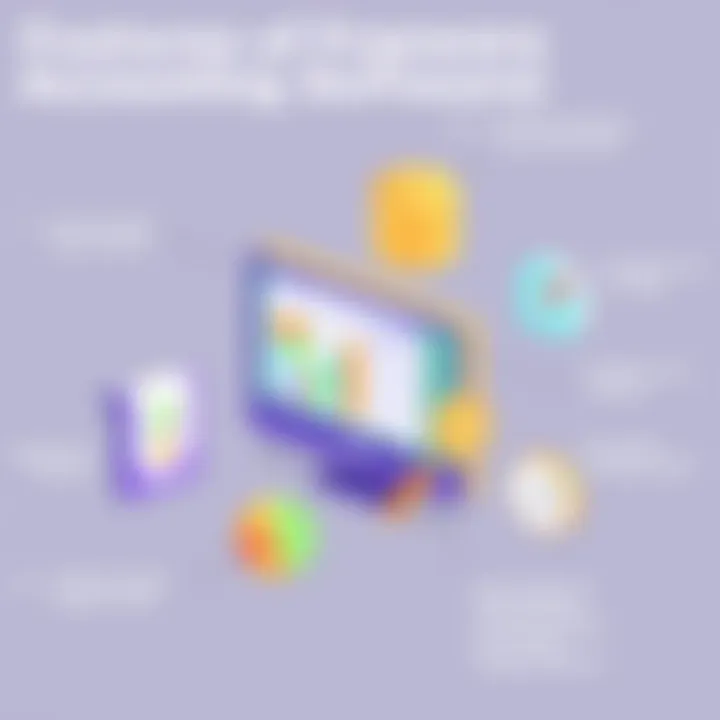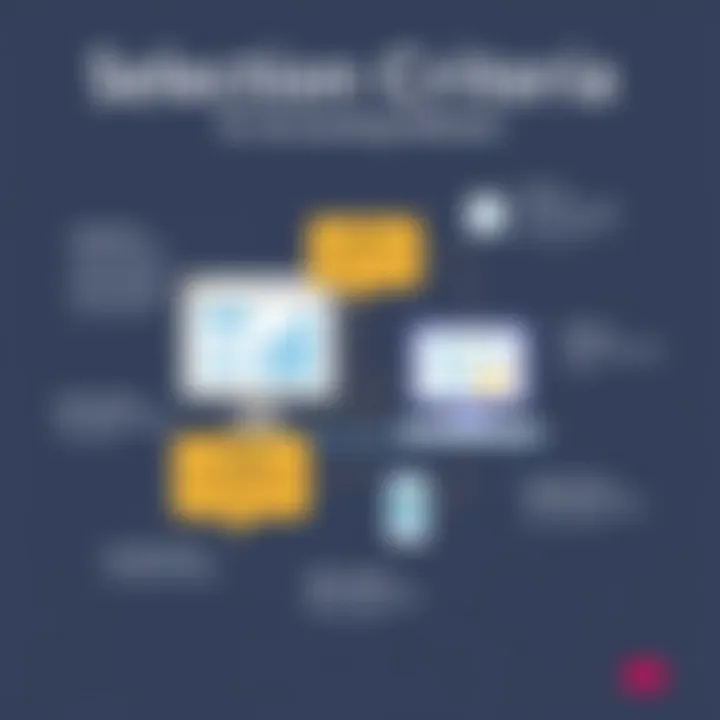Unlocking the Potential of Freeware Accounting Tools


Intro
In the era of rapid digital transformation, small to medium-sized enterprises are increasingly turning to freeware accounting software to meet their financial management needs. Utilizing such a solution can be a double-edged sword, promising cost savings while also presenting challenges in terms of functionality and support. This guide takes a closer look at freeware options available in the market, dissecting their capabilities, advantages, and potential drawbacks.
With the right software, businesses can streamline their accounting processes, making it easier to manage everything from invoicing to tax preparation. For entrepreneurs and IT professionals, understanding these tools is essential—it's not just about crunching numbers but also about making informed choices that can shape the financial future of a business. Let's dive into the significant features that any solid freeware option should encompass.
Preface to Freeware Accounting Software
In an era where every cent counts, especially for small and medium-sized businesses, the significance of freeware accounting software cannot be overstated. This segment will shed light on how freeware options can serve as a beacon for entrepreneurs and IT professionals venturing into the realm of financial management without breaking the bank.
Access to Essential Tools
Freeware accounting software typically comes equipped with essential tools that are necessary for maintaining financial health. You can manage invoices, track expenses, and generate basic reports, all without spending a dime. This accessibility enables startups and smaller businesses to operate efficiently and gives them a solid foundation to grow from.
Cost-Effective Solutions
Many entrepreneurs are in the struggle of balancing tight budgets. Investing in accounting software can often feel like an unnecessary expense when funds are limited. Freeware options allow these businesses to maintain accurate financial records without the burden of subscription fees or hefty one-time payments. The benefits? More money in your pocket can translate into better products or services and enhanced marketing efforts.
Community and Support
Often, freeware solutions have vibrant communities supporting them. These communities can be goldmines for knowledge, where users share tips and tricks for maximizing the software's potential. New users can turn to forums or social media groups to ask questions, troubleshoot issues, or simply learn from others' experiences. Such resources are invaluable, especially for those who might not have dedicated IT staff.
Considerations for Use
While the appeal of freeware is undeniable, it’s crucial to approach these solutions with a discerning mindset. Many freeware options might lack advanced functionalities that paid software provides. It's wise to assess such needs ahead of time, so that users can make informed decisions tailored to their business goals. Alongside this, understanding any potential limitations in terms of data storage or customer support can significantly impact your choice.
What is Freeware Accounting Software?
In the evolving world of business management, understanding the facet of freeware accounting software is critical. It caters to the needs of many small to medium-sized enterprises—businesses that often operate with limited budgets yet require efficient solutions for financial tracking. Freeware accounting solutions offer a way for these entrepreneurs to maintain their books without stretching their finances thin. However, while these tools can provide substantial benefits, they come with a set of characteristics and limitations that call for careful consideration.
Defining Freeware in the Software Landscape
When we speak of freeware, we refer to software that is available to users at no cost. However, this doesn't mean it lacks quality or functionality. Instead, freeware is often developed to serve specific needs without the financial barriers that come with commercial software. In essence, freeware is part of a broader open-source movement, encouraging collaboration and sharing among developers and users alike.
Think about freeware as a friendly neighbor who lends you tools or shares their garden vegetables without expecting anything in return. It fosters a sense of community, while also empowering users to take control of their financial data.
Key Characteristics of Freeware Accounting Solutions
Freeware accounting software presents certain distinct traits, setting it apart from traditional paid solutions. Below are some key characteristics that users should always keep in mind:
- Cost-Free: The primary allure of freeware accounting solutions lies in their cost. Organizations can utilize these tools without worrying about licensing fees. This is particularly valuable for startups and freelancers trying to make every penny count.
- User-Friendly Interface: Many freeware options prioritize ease of use. It's essential for someone who might not have a finance background to navigate them without hassle. Just like teaching someone to ride a bike, the smoother the introduction, the more likely they’ll stick with it.
- Community-Driven Improvements: Freeware often evolves through community input. Users can suggest features, report bugs, and sometimes even contribute to the coding. This collaborative nature can lead to continuous improvement and innovation.
- Variety of Options: A plethora of freeware accounting solutions exist, from basic ledger tools to more complex systems offering inventory management and invoicing capabilities. Each solution can cater to different business needs, which is like choosing between a simple bicycle and a mountain bike based on your requirements.
In summary, freeware accounting software is a valuable resource in the software landscape, especially for small businesses and entrepreneurs. By understanding its defining qualities and characteristics, entities can align their accounting needs with suitable tools, fostering a more effective financial environment.
Benefits of Freeware Accounting Software
When diving into the world of accounting, businesses often face a fork in the road when it comes to the tools they choose for managing their financial affairs. Freeware accounting software has gained traction in recent years, particularly among small to medium-sized enterprises and entrepreneurs. Understanding the benefits of these free tools is crucial, as they offer viable solutions without the hefty price tag associated with their paid counterparts. This section will outline the key advantages that can make freeware an attractive option for various businesses.
Cost-efficiency and Budget Considerations
First and foremost, the most alluring aspect of freeware accounting software is its cost-effectiveness. Many startups and small businesses operate on tight budgets and often have to stretch every penny. Choosing free software can significantly alleviate financial pressure while still providing essential accounting functions. The typical paid software can range from hundreds to thousands of dollars annually. By opting for freeware, businesses can utilize those funds for other critical areas like marketing or product development.
Cost efficiency isn't just about the sticker price; it extends to the hidden costs of ownership as well. Many freeware options have a straightforward installation process, reducing the need for extensive training or technical support. For a small business, this can translate to savings not just in capital but also in time and workforce allocation. Choosing a freeware solution can be likened to finding a nice pair of shoes at a thrift store — they may not be designer, but they get the job done at a fraction of the cost.
Accessibility and User-Friendliness
Navigating the world of accounting can feel like traversing a minefield, especially for those without formal training. Freeware accounting options tend to be more accessible than their paid counterparts. Many such programs have been designed with the end-user in mind, ensuring that even those who aren’t mathematically inclined can still manage their finances with relative ease. Freeware often features intuitive interfaces, making them approachable even for novice users.
The user-friendliness aspect of freeware is about more than just a nice-looking dashboard. It encompasses comprehensive features that are easy to navigate. With the right freeware, the average user can swiftly understand how to enter transactions, generate reports, and even track expenses without calling in tech-savvy friends or hiring consultants. Moreover, many freeware solutions are available online, allowing users to access their accounts and make changes from virtually anywhere.
"Easy access to financial software can empower even the smallest businesses to maintain their accounting with confidence."
Community Support and Contributions
Another significant advantage of freeware accounting solutions is the robust community support that often accompanies them. The users of these programs frequently form online communities, which can be invaluable resources for troubleshooting and advice. When someone encounters a problem or has a question, it's likely that somebody else has faced the same issue and is eager to lend a hand.
Different forums and platforms, such as Reddit or specialized Facebook groups, provide spaces for users to share their experiences, tips, and even contribute enhancements or plugins to the software. This collaborative spirit results in constant improvements and updates, often pushed out by enthusiastic contributors who are invested in the software's success.
In essence, while not all freeware accounting solutions may come with professional support, the collective knowledge and insight available from a user community can frequently fill that gap.
Overall, the benefits of freeware accounting software—its cost-efficiency, user-friendliness, and community support—make it an appealing choice for businesses looking to simplify their financial management without breaking the bank.
Drawbacks of Freeware Accounting Software


While freeware accounting software offers an enticing way for businesses to manage their finances without the burden of upfront costs, it’s essential to peel back the layers and explore some of the more challenging aspects that come with these solutions. Understanding these drawbacks is crucial to making an informed decision that aligns with your business needs.
Limited Features Compared to Paid Alternatives
One of the most glaring downsides of freeware accounting software is its often limited feature set. While some free programs may deliver basic functions such as invoicing, expense tracking, and financial reporting, they frequently fall short in areas that businesses might deem critical. For instance, advanced features such as payroll processing, project management tools, and robust analytics may be absent or only available in a stripped-down version.
As Helen, a small business owner, put it, "Using a freeware accounting program felt like trying to cook a gourmet meal with just a butter knife and a cutting board. Sure, I could get dinner on the table, but the options were limited and I couldn't make anything spectacular."
This lack of comprehensive functionality can result in frustration over time, particularly for businesses that experience growth and have evolving needs. Upgrading to a paid option later may become necessary, which can lead to disruptions and additional costs at an inconvenient time.
Potential Security Risks
Another serious consideration in the realm of freeware accounting software is security. Many of these programs do not offer the robust security features you’d expect from paid solutions. With cyberattacks becoming increasingly common, the security of sensitive financial data must be a priority for any business.
Freeware doesn’t typically have the same level of investment in user security protocols or compliance certifications that establish trustworthiness. While it’s not the case that all freeware is unsafe, users may find that data encryption, secure servers, or regular security updates are not standard.
To illustrate this point, consider a small logistics company that relied on a free accounting software. When their database was compromised, confidential client information was exposed, leading to not just financial loss but also significant damage to their reputation. As the saying goes, "A grain of prevention is worth a pound of cure," and this emphasizes the importance of being cautious when dealing with free software.
Reliability and Stability Concerns
Last but not least, there are reliability and stability issues that often plague freeware accounting solutions. These programs may not undergo the same rigorous quality testing as their paid counterparts, potentially leading to software bugs and unexpected crashes. Imagine a last-minute pricing update or an urgent invoice needing to be sent out, and the software suddenly crashes.
According to IT professionals, systems should always function impeccably, especially in handling critical tasks such as financial management.
Businesses might face downtimes, which can lead to missed deadlines, disgruntled clients, and ultimately, loss of sales. Users have expressed that the absence of customer support is another aggravating factor; troubleshooting becomes more of a challenge when the only resource is a disjointed online forum.
In summary, while freeware accounting software provides an attractive option for budget-conscious businesses, it is essential to weigh these drawbacks carefully against your operational needs. The key is to prioritize functionality, security, and reliability to ensure your business does not fall into pitfalls that could have been avoided.
Freeware may save you a buck, but it could cost you in more ways than one.
Key Features to Look for in Freeware Accounting Software
When diving into the world of freeware accounting software, it's essential to zero in on key features that can make or break your accounting experience. With various options available, understanding the specific elements to focus on not only enhances your user experience but ensures that your business operations run smoothly. In this section, we’ll dissect what to look for in terms of functionality, usability, and compatibility while emphasizing how these features can directly influence your financial management.
Basic Accounting Functions
At the heart of any accounting software lies its core functionalities. Basic accounting functions are a must-have for small to medium-sized businesses aiming to streamline their financial processes. Look for features like accounts payable and accounts receivable management, which allow you to track incoming and outgoing funds effectively.
Keeping a close eye on balance sheets and income statements is also crucial, enabling you to visualize the company's financial health at a glance. Additionally, functions for managing invoices and expenses help maintain clarity in financial records.
Without these fundamental tools, your efforts in managing finances could easily become disorganized.
Reporting Capabilities
While processing numbers is essential, turning those numbers into actionable insights is where the magic happens. Therefore, robust reporting capabilities should be non-negotiable when selecting freeware accounting software. This will empower you to generate customized reports that reflect your organization's specific needs.
A solid system can provide real-time data analytics, summarizing performance metrics and trends. The ability to create cash flow projections and profit and loss reports helps in planning and strategizing for the future.
Most importantly, a well-designed reporting tool captures important data without convoluted steps. Regularly reviewing these reports aids in identifying potential issues before they escalate. In essence, if I can’t get a handle on how my money flows, I'm walking a tightrope.
Integration Options
The last piece of the puzzle, yet often overlooked, deals with integration options. In today’s interconnected world, software compatibility is a game-changer. Choosing freeware accounting software that can seamlessly integrate with other critical tools your business might be using—be it CRM solutions, e-commerce platforms, or payroll systems—can elevate your overall efficiency.
Imagine having your accounting software sync effortlessly with your payment processing platform, like PayPal or Stripe, so that transaction records are updated automatically. This not only saves labor hours but minimizes human error, which can lead to costly mistakes.
Integration isn’t just about convenience; it’s also about cultivating a more holistic view of your operations. If one part of your tech stack doesn’t play nice with another, you could find yourself in a logistical nightmare.
"The right accounting software should feel like a partner in growth, adapting and fitting into your existing systems as easily as a glove on a hand."
By focusing on these key features—basic accounting functions, robust reporting capabilities, and effective integration options—you lay a solid foundation for using freeware accounting software that sufficiently meets your business needs. Navigating the maze of financial software becomes far less daunting when you know exactly what to keep an eye out for.
Top Freeware Accounting Software Options
When considering the plethora of freeware accounting software available today, it becomes paramount for small to medium-sized businesses, entrepreneurs, and IT professionals to identify the right tools that could streamline their financial management. Freeware options can significantly lower costs, but their varied capabilities and limitations require careful consideration.
Freeware accounting software can offer core functionalities that address basic accounting needs, making them an attractive choice for startups and businesses operating on tight budgets. However, navigating the landscape of available software is not as simple as it appears.
Digesting the nuances of different options ensures that businesses avoid pitfalls and find solutions that align with their requirements. The following subsections elaborate on some standout offerings, along with their respective advantages and drawbacks.
Software Comparison Overview
In this section, we will explore several freeware accounting software solutions, breaking down their features, usability, and support offered by their communities and developers. Comparing these tools on a broader scale helps to identify which software reliably meets business needs. Below, we will highlight essential characteristics of each individual software offering:
- User Experience: How friendly and intuitive the user interface is for those who might not be tech-savvy.
- Functionality: The range of features available, from basic bookkeeping to advanced reporting options.
- Community and Support: The availability of help and resources from other users and developers.


With these key areas in mind, let’s delve deeper into specific software options available for businesses looking to take advantage of freeware solutions.
Detailed Analysis of Popular Choices
Software A Overview
One such popular option is GnuCash. This software stands out for its robust double-entry accounting system, allowing users to track bank accounts, income, expenses, and other financial activities with precision. It is a beneficial choice as it caters to both personal finance needs and small business applications.
A distinct feature of GnuCash is its ability to manage multiple currencies, which is an advantage for businesses operating on an international scale. However, the complexity of the software can be a hurdle for some, necessitating a learning curve that may not appeal to all users.
Software B Overview
Next, we have Wave Accounting. This software is especially popular among freelancers and small businesses due to its streamlined features. The highlight of Wave is its no-cost invoicing functionality, making it an excellent pick for service-oriented enterprises.
While Wave is easy to use, a significant downside is the limited reporting options it offers, which may not meet the needs of businesses aiming for in-depth financial analysis.
Software Overview
Finally, let’s explore ZipBooks. Primarily known for its user-friendly interface, ZipBooks provides essential accounting tools, including invoicing and expense tracking. One of its key characteristics is a built-in time tracking feature, making it a sensible choice for businesses monitoring billable hours.
However, the free version of ZipBooks comes with restrictions on certain reports, which could be a limitation for those seeking comprehensive insights.
Each software has its unique flair, and understanding these nuances will help businesses select the best tool tailored to their specific financial requirements.
Downloading Freeware Accounting Software
As businesses look to manage their finances effectively while keeping costs down, freeware accounting software can be a game changer. The process of downloading such software is not merely a task of pushing a button; it requires a thoughtful approach to ensure that what you're downloading is safe, reliable, and suited to your specific needs. In this section, we will discuss the nuances of downloading freeware accounting software, touching on where to find trustworthy downloads and how to navigate the installation process once you've made your choice.
Where to Find Reliable Downloads
When it comes to sourcing freeware accounting software, reliability is key. It's akin to finding a diamond in the rough—there's plenty of sparkle, but a keen eye is needed to spot the genuine article. Here are several avenues where you could find dependable downloads:
- Official Websites: Always start at the developer's official website. This is often the best source for the latest versions and updates. Companies like GnuCash and Wave offer downloadable files right from their sites.
- Software Repositories: Trusted software repositories like SourceForge or GitHub can be treasure troves for finding open-source solutions. These platforms often have user ratings and community feedback that can guide your choice.
- User Reviews and Forums: Sites like Reddit and specialized forums contain reviews and experiences from other users which can flag potential issues or highlight hidden gems.
- Academic and Government Resources: Websites ending in .edu and .gov often provide links and recommendations for software that has been vetted for use in various applications, including accounting.
"In the world of freeware, a little research goes a long way. Safety should always be your top concern when downloading any software.”
Installation Guidelines and Steps
Once you've found your software, the next step is installation, which, while straightforward in many cases, can be riddled with pitfalls if not approached carefully. Here's a step-by-step guide:
- Downloading the Software: Click on the download link that you have identified as trustworthy. Ensure that the file type is correct, typically a .exe for Windows or a .dmg for Mac.
- Antivirus Check: Before opening the file, run it through your antivirus software. This step is crucial to detect any malicious code hidden in the download.
- Follow Installation Prompts: Clicking on the downloaded file will launch the installation wizard. Follow the prompts carefully. Pay attention to dropdowns and checkboxes, as these often include additional software or settings you might not want to install.
- Configure Settings: Tailor the settings presented during installation according to your preferences. For instance, if you run multiple businesses, indicate this to set the software up accordingly.
- Create User Accounts: Once installed, you will often need to set up user accounts. Make sure to choose strong passwords and review user roles if multiple people will be accessing the software.
- Backup & Update: Lastly, always create backups and check for updates post-installation, ensuring that you’re using the latest version with all available features and security patches.
By taking the time to thoughtfully download and install freeware accounting software, you're setting your business up for financial success. The effort you invest in these initial stages can significantly impact the efficiency and reliability of your accounting processes.
Case Studies: Implementing Freeware Accounting Solutions
Diving into the realm of freeware accounting solutions offers tangible benefits for small to medium-sized enterprises, but real-world implementations tell a more textured story. Case studies reveal how specific businesses utilized freeware to manage their accounting while also highlighting the setbacks encountered in the process. This component of the guide represents not just anecdotal evidence; it forms a vital bridge between theoretical advantages and practical application. By examining these instances, readers can grasp the real-world implications, advantages, and challenges tied to such solutions.
Success Stories from Small Businesses
When small businesses opt for freeware accounting software, they often do so driven by budget constraints. Yet, many have achieved significant milestones that speak to the effectiveness of these platforms. For instance, a local coffee shop, Brewed Awakening, adopted a freeware program called GnuCash. This tool allowed them to streamline financial records without needing extensive training or a hefty upfront investment.
In their case, it wasn't just about numbers; it came down to managing resources better. During a challenging quarter, their owner used GnuCash to identify areas where expenses could be trimmed, help him pivot strategies, and ultimately stabilize cash flow. By using data-driven decisions, Brewed Awakening not only survived the tough economic landscape but thrived, doubling their sales over the following year.
A tale like this showcases how cost-effective tools can provide a backbone to decision-making and illustrate that success doesn’t always need to be expensive. The community feedback was also instrumental, with customers praising the transparency in Brewed Awakening's operations as they introduced seasonal products that resonated well.
Challenges Faced During Adoption
Nonetheless, the journey is rarely all smooth sailing. Looking at challenges within these case studies gives a clearer picture. Consider another venture, TechSolutions, aiming to implement freeware like Wave Accounting. While the software offered great features at no cost, the team faced several hiccups during its adoption. The learning curve became a stumbling block, especially for less tech-savvy employees unfamiliar with digital accounting practices.
Additionally, TechSolutions encountered compatibility issues between their primary operating systems and the freeware programs. These concerns impeded seamless data workflows, creating frustration among the staff and momentarily derailing productivity. They had to balance patience with the necessity of ongoing operational demands, which isn’t always an easy task.
Interestingly, knowing the pitfalls informed their eventual choice. They attended online forums and webinars through sites like Reddit and Stack Overflow, which provided practical insights, often leading to creative solutions. Users shared experiences that felt relatable, often distilling the complexities into actionable advice.
The combination of success stories, hurdles faced, and how businesses have navigated these situations enriches the narrative around freeware accounting software. It transitions from theoretical lists of benefits to the gritty realities that define everyday use in the small business landscape. Collective experiences like those of Brewed Awakening and TechSolutions create an invaluable repository of knowledge that future adopters can learn from.
Security Considerations in Using Freeware Accounting Software
When navigating the vast and often turbulent seas of freeware accounting software, the priority of security remains paramount. Using free software, while alluring due to its cost-effectiveness, can pose certain risks that might not be immediately apparent. It's vital to understand these risks and the implications they bring to small to medium-sized businesses and entrepreneurs who depend on accurate financial management. With the ever-increasing threat of cyberattacks and data breaches, overlooking security considerations can lead to devastating consequences for your business.
Understanding Data Privacy Risks
First and foremost, it’s essential to recognize that with freeware software, data privacy is like a double-edged sword. On one hand, you get a no-cost solution, but on the other, the potential for compromised data can loom large. Often, freeware lacks comprehensive support for data encryption, leaving sensitive business information vulnerable.
Moreover, while some freeware may tout innovative features, they might not adhere to the same stringent security protocols as their paid counterparts. Without regular updates or patches, stale software can become an easy target for malicious actors. It's worth considering that some freeware could potentially exploit your data for profit or provide insufficient protection against unauthorized access. If sensitive financial data falls into the wrong hands, it could not only hinder your business operations but also tarnish your reputation. Therefore, a thorough investigation into the software’s privacy policies and user reviews should be a non-negotiable step before committing.
"Investing in security is as important as the financial records you keep. Don't let security slip through the cracks of freeware's appeal."


Implementing Best Practices for Security
Now that we've addressed the potential pitfalls, let's shift gears to focus on how to mitigate these risks. Adopt a proactive stance by implementing robust security practices. Here are several recommendations that can bolster your defense:
- Regular Software Updates: Always prioritize keeping your software updated. Many developers release patches and updates to fortify security vulnerabilities.
- Data Encryption: If the freeware doesn’t provide encryptions, look for alternatives that do. Always ensure that your data is locked away from prying eyes, both in transit and at rest.
- Access Control Measures: Be it user accounts or admin credentials, implement strict access controls. Only those who need access to financial records should have it. This can significantly reduce exposure to internal and external threats.
- Backup Regularly: Regular backups of your financial data can serve as a safety net against data loss due to software failure or breaches. Maintain offline copies just in case it goes south on the online front.
- Educate your Team: Conduct training sessions on best practices for handling sensitive information. Phishing attacks and social engineering tactics are ever-evolving, and an informed team can be your first line of defense.
By astutely understanding the risks and implementing robust best practices, you can maintain a stronghold over your financial data. Security is not just a checkbox; it’s an ongoing effort that demands awareness and commitment.
Future Trends in Freeware Accounting Software
The landscape of freeware accounting software is constantly shifting, shaped by technological advancements and market demands. As we analyze future trends in this domain, we must recognize the intersection of innovation and practicality for small to medium-sized businesses. The evolution of these tools isn’t merely a trend; it’s a necessary adaptation to a world that values agility in financial management. By keeping a pulse on emerging technologies and anticipated functionalities, businesses can seize opportunities while mitigating risks associated with outdated tools.
Emerging Technologies Impacting Accounting
The influx of new technologies has begun changing how accounting is performed, especially in freeware solutions. Artificial Intelligence (AI) and Machine Learning (ML) have started to smoothen workflows that once required intense manual labor. Here are a few notable trends in this area:
- Automated Data Entry: The ability of software to extract data from invoices and receipts, minimizing human input, is revolutionizing efficiency. Imagine software that can read a receipt and categorize expenses without you lifting a finger.
- Cloud Computing: Freeware solutions increasingly employ cloud technology, granting users instant access from anywhere. This flexibility is essential for business owners who find themselves on the move or working remotely.
- Blockchain Technology: While still in its infancy, blockchain has the potential to revolutionize how transactions are recorded, enhancing transparency and security for all parties involved.
As these technologies mature, they will not only improve operational efficiency but also enhance data accuracy, allowing business owners to make more informed financial decisions. The rise of these advancements also leads us to consider their implications on cyber security and how users can stay protected while harnessing these modern tools.
Potential for Increased Functionality
The capabilities of freeware accounting software are expanding beyond the basic features traditionally associated with free solutions. As competition increases, developers are pushed to innovate and broaden their offerings. Future trends may include:
- Advanced Reporting Tools: Users can expect to see more comprehensive analytics features in freeware, allowing for deeper insights into financial health without the hefty price tag.
- Customizable Interfaces: Software that can be tailored to meet unique business needs will become increasingly accessible. The idea of a one-size-fits-all solution is fading as tools need to address specific niches.
- Mobile Functionality: As the reliance on smartphones grows, accounting applications will focus on improving mobile usability. This trend caters to business owners who prefer managing their finances directly from their devices.
"Shifting towards a more flexible and functional accounting solution is not just an option; it’s a lane that small business owners must navigate to ensure longevity in an ever-changing marketplace."
Finale: Evaluating Freeware Accounting Software
In the landscape of financial management, choosing the right accounting software can feel like searching for a needle in a haystack, especially with the multitude of options available. Freeware accounting software offers an accessible entry point for many entrepreneurs and small to medium-sized businesses, but it's crucial to approach the decision-making process with thoughtfulness. This article has laid bare the benefits, limitations, and key features of various freeware solutions, empowering readers to navigate the waters of accounting software with greater clarity.
One salient aspect discussed is the balance between cost and capability. Freeware solutions can save a pretty penny, allowing businesses to allocate resources elsewhere—perhaps into marketing or product development. However, while the initial appeal is undeniable, one must weigh the long-term implications of any decision. Freeware often lacks the robust capabilities that paid counterparts provide, which could stymie growth if your business expands.
Making an Informed Decision
When it's time to make a choice about accounting software, it’s all too easy to be swayed by the allure of free options. Yet, it's essential to scrutinize the specific needs of your business. Here are some points to consider:
- Evaluate Your Needs: Understand whether the accounting tasks you face are basic or whether they require complex functions. If you're dealing with multiple revenue streams or need intricate reporting, freeware might not cut it.
- Feature Assessment: Identify what features are non-negotiable for your operations. Does the software provide invoicing, tracking expenses, or tax preparation tools? Prioritize based on what is essential for your business.
- Scalability: Look beyond the present. Will the software grow with you? If you foresee an uptick in transactions or user needs, ensure the freeware can accommodate these changes.
Ultimately, the decision lies in a careful assessment of present and future business scenarios.
When to Choose Paid Alternatives
Making the leap to paid accounting software could be a smart move, depending on several circumstances. Here’s when you might opt to do so:
- Advanced Features Needed: If your business requires advanced functionalities, such as detailed financial reporting, data analytics, or integrations with other platforms, a paid solution may be warranted.
- Enhanced Security Requirements: When handling sensitive financial information, nothing beats the peace of mind offered by a solution with robust security measures. Paid software often includes higher standards of encryption and support against cyber threats.
- Ongoing Customer Support: Freeware typically relies on community support, which can be patchy at best. Paid options often offer comprehensive customer service, assuring that help is readily available when you encounter issues.
- Integration with Other Software: If your business already uses software systems for customer relationship management or inventory tracking, investing in a paid accounting solution with integration capabilities can save you time and trouble.
In choosing between freeware and paid options, it pays to evaluate the present needs against future aspirations. Ultimately, the right choice can set the foundation for fiscal harmony and informed decision-making.
"The best way to predict your future is to create it." – Abraham Lincoln
For further reading on software evaluations and recommendations, consider checking out resources on sites such as Wikipedia, Britannica, or forums like Reddit. These platforms can provide a wealth of peer-reviewed insights and user experiences.
Additional Resources and References
In the digital age, sourcing accurate information is paramount for informed decision-making, especially when it comes to choosing the right accounting software for your business. The section dedicated to Additional Resources and References acts as a lifeline for entrepreneurs and IT professionals navigating the often complex terrain of freeware accounting options. Here, the significance of accessible resources becomes clear.
Importance of Additional Resources
The world of freeware accounting software is vast and varied. From user manuals to community forums, the availability of resources can empower users to maximize the capabilities of their chosen software. These resources often demystify complex processes and provide solutions that aren't immediately evident. For example:
- User guides and documentaries can offer step-by-step assistance on software installation and setup.
- FAQs or knowledge bases often contain troubleshooting tips for common issues.
Moreover, community-driven platforms like Reddit can provide invaluable insights from fellow users who have faced similar challenges. This peer support can often lead to solutions that formal sources might not provide.
Benefits of Academic and Government Sources
Citing reliable institutions can often lend credibility to the choices you make. Academic articles and government resources add a layer of trust. For instance, scholarly studies may explore the effectiveness of various accounting software or reveal statistical data on user satisfaction. Here are some sources that can be beneficial:
- Wikipedia - A wealth of general knowledge.
- Britannica - Authoritative articles on technology and accounting basics.
- Government (.gov) resources - Offer guidance on regulations that may impact your choices in accounting software.
Navigating Practical Resources
In addition to academic references, practical tools also contribute to well-informed decisions:
- Online Tutorials: Websites like YouTube feature videos that walk users through software features.
- Forums and Discussion Boards: Platforms such as Facebook and Reddit host communities where users can ask questions and get feedback easily.
- Reviews and Comparisons: Websites like Capterra and G2 provide user reviews and ratings, helping potential users gauge the pros and cons of various options.
"Failing to prepare is preparing to fail." This age-old saying resonates strongly in the context of selecting accounting software. Taking advantage of reliable resources ensures you're not just shooting in the dark.
Considerations About Resources
While accessing resources is crucial, discerning their quality is equally important. Verify the credibility of the content you consider—assess the author's background, the publication's reputation, and the recency of the information. A well-rounded approach to resource gathering can vastly improve your understanding and implementation of freeware accounting solutions.















